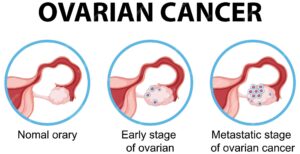Beyond a shadow of a doubt, women experience various changes throughout their lives due to hormone fluctuations, cysts, diminished ovarian reserve, and age-related infertility. Additionally, they encounter various health issues related to the ovaries, including polycystic ovarian syndrome (PCOS). Polycystic ovarian syndrome, an endocrine disorder, has become a major concern among girls and women worldwide, affecting millions, including those in India. According to the World Health Organization, PCOS affects an estimated 8–13% of reproductive-aged women, with up to 70% of cases going untreated.
PCOS is characterized by chronic anovulation, causing symptoms such as an irregular menstrual cycle, hirsutism, weight gain, and many more. In India, it is 3.7–22.5%, as per the release published by the Press Information Bureau. While known for its impact on fertility and metabolism, girls with PCOS face additional challenges as they are at a higher risk of developing ovarian cancer. As a result, early identification and prevention efforts created specifically for the population are critical to ensuring their long-term health and well-being.
Prevention Strategies to Reduce the Risk of Cancer
There is no denying the fact that PCOS affects women of reproductive age; thus, it is clear that PCOS has become a predominant concern in our country. According to the American Cancer Society, ovarian cancer is the sixth leading cause of cancer death in women, accounting for more fatalities than any other malignancy of the female reproductive system.
following are some strategies girls with PCOS can consider for lowering their risk for ovarian cancer:
Early detection as a catalyst: Given the recent development and technological advancement, early detection has emerged as a catalyst, improving the survival of vulnerable girls suffering from ovarian cancer and PCOS. Through early detection, medical professionals are able to identify and diagnose cancer in girls at a younger age, allowing for timely intervention and treatment. This not only helps manage the symptoms and complications associated with the disorder but also empowers these girls to make informed decisions about their reproductive health as they grow older.
Nutrition and Lifestyle modification: Adopting a healthy lifestyle is one excellent prevention method that emerged at the forefront to minimize the risk of cancer in an age where people are constantly on the go. This includes eating a nutritious well-balanced diet, exercising regularly, and avoiding dangerous behaviors like tobacco and excessive alcohol intake. Furthermore, regular screenings and check-ups can aid in the early detection of any potential indicators of cancer, boosting the chances of effective treatment. Studies have shown that women who engage in regular physical activity and maintain a healthy weight, supplemented with proper nutrition have a lower risk of developing this type of cancer.
Bilateral salpingectomy:
While adopting healthier lifestyle habits is a positive step, bilateral salpingectomy in young girls with Polycystic Ovary Syndrome (PCOS) emerges as a proactive strategy for ovarian cancer prevention, especially for women in higher-risk categories like those who are BRCA1/2 positive. Bilateral salpingectomy is a minimally invasive treatment that removes both fallopian tubes, lowering the risk of ovarian cancer by removing the place where most ovarian malignancies begin. This also addresses potential complications associated with PCOS. It may also offer the extra benefit of lowering the risk of ectopic pregnancies. However, given the implications for future fertility, seeking advice from medical experts is crucial for individualized assessments, emphasizing the importance of informed decisions and comprehensive care.
Towards Healthy Living!
While PCOS is a prevalent hormonal disorder that hinders women’s reproductive health, it has also been associated with ovarian cancer development. As a result, early detection and prevention measures have appeared as critical strategies for dealing with possible risks.
The author is Co-Founder & Chief Scientific Officer at PredOmix.














